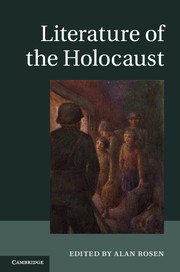Book contents
- Frontmatter
- Contents
- Notes on contributors
- Acknowledgments
- Introduction
- Part I Wartime victim writing
- Part II Postwar responses
- Chapter 3 The Holocaust and Italian literature
- Chapter 4 German literature and the Holocaust
- Chapter 5 Hebrew literature of the Holocaust
- Chapter 6 The Holocaust and postwar Yiddish literature
- Chapter 7 The Holocaust in Russian literature
- Chapter 8 The Holocaust in English-language literatures
- Chapter 9 Polish literature on the Holocaust
- Chapter 10 Hungarian Holocaust literature
- Chapter 11 French literature and the Holocaust
- Part III Other approaches
- Guide to further reading
- Index
- References
Chapter 9 - Polish literature on the Holocaust
Published online by Cambridge University Press: 05 June 2014
- Frontmatter
- Contents
- Notes on contributors
- Acknowledgments
- Introduction
- Part I Wartime victim writing
- Part II Postwar responses
- Chapter 3 The Holocaust and Italian literature
- Chapter 4 German literature and the Holocaust
- Chapter 5 Hebrew literature of the Holocaust
- Chapter 6 The Holocaust and postwar Yiddish literature
- Chapter 7 The Holocaust in Russian literature
- Chapter 8 The Holocaust in English-language literatures
- Chapter 9 Polish literature on the Holocaust
- Chapter 10 Hungarian Holocaust literature
- Chapter 11 French literature and the Holocaust
- Part III Other approaches
- Guide to further reading
- Index
- References
Summary
From the outset Polish literature on the Holocaust featured a clear division into victims/survivors (i.e. Polish-Jewish writers) and witnesses/observers (Polish non-Jewish writers). This fundamental division continues along successive generations, extending to those who were born toward the end of the war or even long after it. Such writers may be termed potential or vicarious victims and witnesses. While in other historical or cultural contexts such a division might provoke doubt, in this case it is justified, as the experiences and perspectives of these two main groups are diametrically different. Indeed, this division between victims and observers became apparent even before the end of the war in Z otchłani (From the abyss, 1944), a clandestinely published collection containing works by both Jewish and non-Jewish writers (including Michał Borwicz, Mieczysław Jastrun, Jan Kott, and Czesław Miłosz).
Each group contains generational sub-groups. Authors born before the war include adults and children. The best-known writers and poets in the “adult” generation are Adolf Rudnicki (1912–1990), Stanisław Wygodzki (1907–1992), and Artur Sandauer (1913–1989) on the Jewish side, and Tadeusz Borowski (1922–1951), Miłosz and Zofia Nałkowska (1884–1954) on the non-Jewish side. The second generation incorporates writers who were children during the war and came to see the Holocaust as fundamental in their formation as individuals and artists. Sometimes the Holocaust is present in their writing virtually from the beginning, as in the case of Henryk Grynberg (b. 1936), while in other instances it appears at a later stage, as in the case of Hanna Krall (b. 1935), for whom the decisive factor was her encounter with one of the leaders of the Warsaw Ghetto Uprising, Marek Edelman. The “children” group also includes Jewish authors who began to speak about their childhood experiences several decades after the war, such as Michał Głowiński (b. 1934) and Wilhelm Dichter (b. 1935). Their counterparts on the non-Jewish side include Andrzej Szczypiorski (1928–2000) and Jarosław Marek Rymkiewicz (b. 1935).
- Type
- Chapter
- Information
- Literature of the Holocaust , pp. 150 - 163Publisher: Cambridge University PressPrint publication year: 2013

